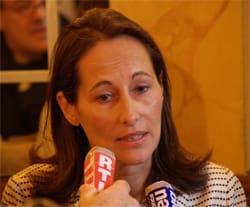She is the headline news, featured on numerous TV channels, and leading the polls. Ségolène Royal is at the center of attention and desire, both within her camp and from other parties that now must contend with the Royal phenomenon.
Nice Première interviewed two elected officials from Nice to learn more about the woman who appears to be the ideal candidate to represent the Socialist Party in the upcoming presidential elections.
Thus, we give the floor to Dominique Boy Mottard and Patrick Allemand who share their views on this new “Royal” path.
Nice Première: What do you think of the candidate Ségolène Royal?
Dominique Boy Mottard: From the moment she is a Socialist, I can only think well of her!
Patrick Allemand: She is a candidate who represents an opportunity for the Socialist Party. She embodies the need for political class renewal better than anyone, a need that the French people are calling for.
NP: Attacks on her are proliferating within the PS. What is your opinion on this?
DBM: But there are not only attacks. Even if within the PS, she undoubtedly has fewer supporters than outside, there are already some rallying to her candidacy. Socialists are unfortunately accustomed to internal strife. What is different this time is that, even within her own camp (which is also that of her partner and the majority of the Party), she is generating a lot of criticism. While I can understand criticisms from someone like Laurent Fabius, who is clearly on a different political line, I am reserved when the attacks come from friends of her own faction. Perhaps this can be attributed to the (very artistic, by the way!) vagueness that currently surrounds the ideas Ségolène Royal will put forward as a candidate for the presidential nomination.
PA: Yes, I have read some national leaders and their local relays criticizing her lack of experience and ideas, etc. I think they would do better to focus their efforts on Sarkozy, who is our real opponent.
NP: The internet seems to be a significant communication tool for Ms. Royal. Do you think the web will play a part in the next presidential elections?
DBM: While we should not underestimate the role the Internet can play in such an election, neither should we overestimate it. Remember the role the Web played in the last American presidential elections: the fact that Democratic candidate John Kerry maximized its use did not prevent George W. Bush from winning. It seems there is still a long way from the virtual world to the ballot box.
PA: Undoubtedly. We have already seen the influence of the web in the referendum and during the CPE conflict. The web will have its influence.
NP: Dominique Voynet said, “She has a judgment on women that is not that of a feminist.” Do you agree or disagree with this statement?
DBM: It’s a judgment that seems a bit too ideological to me. It’s true that S. Royal’s speech on the issue is not really what we’re used to hearing; it’s less combative. Maybe it is indeed too early to take this path? The feminist cause is not yet won…
PA: Not in agreement.
NP: 143 rebels denounce a “celebritization” of Ségolène Royal’s politics. As Coluche would say, “which side are you on, comrade”?
DBM: I can only agree with the denunciation of the celebritization of political life (which, between us, doesn’t only concern S.Royal). But I cannot help thinking that, among these 143 rebels, there are a few who would quite like to be in her place… Perhaps I am being cynical… I am aware that in saying this, I risk being disliked by everyone!
PA: I am very hostile to this notion of “celebritization.” From my point of view, it does not apply to Ségolène Royal. She currently has media coverage that corresponds to the interest she arouses, the novelty. There is Match, sure, but also Le Point, L’Express, Le Nouvel Observateur, Les Echos, it’s not exactly Gala or Closer.
NP: Several Regional Presidents support the candidate Royal. Don’t you think these opinions express a real need for change within the PS?
DBM: Change is not a value in itself. For example, Sarkozy keeps promoting change, Villepin claimed to do it with his CPE: they talk about change while wanting to impose a particularly reactionary policy. What is important is: change to do what? Of course, image is important (embodying change) and so we cannot dismiss it in a society focused on communication like ours. But we cannot be content with that: it’s not just a question of style.
PA: Yes, the involvement of many regional presidents alongside one of their own is indicative of an evolution. It is no longer just the National Bureau cartel concerned with the presidential question. And since the reform of the electoral system, the Presidents of Regional Councils have strong popular legitimacy. Their call has an influence, that’s clear!
NP: Finally, can you imagine a female President of the French Republic in the future?
DBM: I have long imagined it – and fortunately – I am not alone! In the Socialist Party (but also in the press), there was a lot of talk, not so long ago, about Martine Aubry who, given her background, seemed able to make an excellent President of the Republic. Moreover, she does not seem to have given up. I would find it particularly interesting that, among the contenders for the throne, several women feature (and not just one woman against men). This would ensure that the candidate would not be chosen based on their gender.
PA: The country is ripe to have a female president of the Republic. Just look at the rise in the polls following the sexist attacks she has been subjected to. It shows a profound evolution in attitudes.


